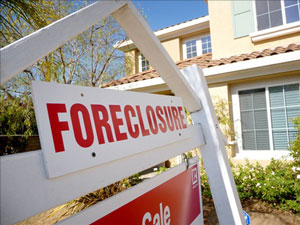Hopeful news and help to prevent home foreclosures
By Nisa Islam Muhammad -Staff Writer- | Last updated: May 2, 2013 - 10:12:19 AMWhat's your opinion on this article?

|
Their statistics also found that the number of properties in the foreclosure process declined nearly 20 percent from a year ago. This was the lowest level since April 2009.
At the end of March there were still 1.5 million U.S. homes in some stage of foreclosure, with 623,697 owned by lenders, according to RealtyTrac. That number is down from a peak of 2.2 million in December 2010.
Most of the problem loans from the crisis have made their way through the foreclosure process, explained Herb Blecher of LPS to reporters. “We’re seeing new loan originations are of high quality and there’s not a lot of new problem loans entering the system.”
The highest number of delinquent mortgages and foreclosure cases are in states that have elaborate foreclosure processes such as Florida, New Jersey, New York, and Nevada.
Cordell and Cynthia Logan are in that number. Their dream home has become a nightmare. “We’ve tried to hold on as long as possible but getting a refi (refinance) modification has been another nightmare. The system seems to be against the working family who is trying to have the American dream,” Mr. Logan told The Final Call.
“We’ve tried everything and everything has failed us. It’s countdown now until the marshals come. We’re packing and moving on. We found an apartment that will take us even though now our credit is shot.”
Change the names and the story is still the same for millions of Americans who suffered and continue to suffer from home foreclosures even though the numbers of properties in foreclosure are going down.
According to Realty Trac there have been close to 10 million homes lost to foreclosure since 2007. Research by the Center for Responsible Lending (CRL) found that, “Although the majority of affected borrowers have been white, African American and Latino borrowers are almost twice as likely to have been impacted by the crisis. For mortgages made between 2004 and 2008, approximately one quarter of all Latino and African American borrowers have lost their home to foreclosure.”
CRL joined with the Consumers Union to outline how state lawmakers can bolster safeguards to prevent unnecessary foreclosures. Their recommendations would close gaps left by new federal mortgage servicing rules and by last year’s settlement among 49 state attorneys general, federal officials and the five biggest mortgage servicers.
“States have yet to recover from the foreclosure crisis that has stripped trillions of dollars from homeowners and devastated local communities across the nation. While the crisis was caused in large part by unscrupulous lending practices that went unregulated, servicing abuses – including the failure to engage in good faith loss mitigation before beginning the foreclosure process – have exacerbated the problem,” according to the report Closing the Gap: What States Can Do to Protect Homeowners From Foreclosure.
“The failure to implement and enforce reasonable regulations against servicers has fostered dangerous practices over the last several decades. Despite recent advancements including the National Mortgage Settlement (NMS), the California Homeowner Bill of Rights (HBOR), and new mortgage servicing rules from the Consumer Financial Protection Bureau (CFPB) that go into effect in January 2014, millions of families remain poised to lose their homes.”
Over the last several years, some of the most significant problems have included the failure to review homeowners for a loan modification and foreclosing on borrowers even as the servicer is considering an application for a modification.
The report recommends adopting a Homeowner Bill of Rights to help reduce as many foreclosures as possible. By doing so states would stabilize local housing markets and protect homeowners. The Center for Responsible Lending and Consumers Union urge state lawmakers to:
Require lenders to engage in loss mitigation activities to prevent avoidable foreclosures.
Restrict servicers from pursuing foreclosure while at the same time processing a request for a loan modification—so-called “dual tracking.”
Require lenders to establish clear procedures for homeowner outreach, straightforward timelines, detailed denial notices that provide full information with affidavits, and reasonable rights of appeal to facilitate the loss mitigation requirement.
Provide homeowners with the right to halt a foreclosure sale when a servicer breaks the law, and until the servicer complies with the law’s loss mitigation requirements.
“Something like this, I think would have really helped us,” said Mrs. Logan. “We felt like we were fighting monsters with no weapons, no rights and no help. This may prevent other families from the nightmares we faced.”
INSIDE STORIES AND REVIEWS
-
-
About Harriett ... and the Negro Hollywood Road Show
By Rabiah Muhammad, Guest Columnist » Full Story -
Skepticism greets Jay-Z, NFL talk of inspiring change
By Bryan 18X Crawford and Richard B. Muhammad The Final Call Newspaper @TheFinalCall » Full Story -
The painful problem of Black girls and suicide
By Charlene Muhammad -National Correspondent- » Full Story -
Exploitation of Innocence - Report: Perceptions, policies hurting Black girls
By Charlene Muhammad -National Correspondent- » Full Story -
Big Ballin: Big ideas fuel a father’s Big Baller Brand and brash business sense
By Bryan Crawford -Contributing Writer- » Full Story






 Click Here Stay Connected!
Click Here Stay Connected!








